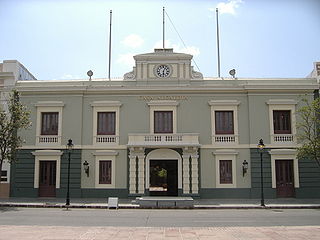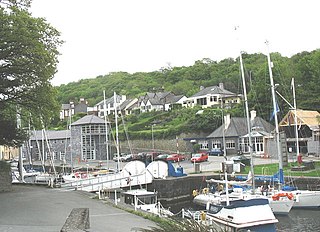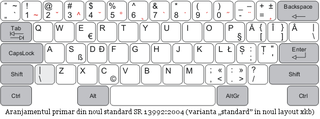
Angola, officially the Republic of Angola, is a country on the west-central coast of Southern Africa. It is the second-largest Lusophone (Portuguese-speaking) country in both total area and population and is the seventh-largest country in Africa. It is bordered by Namibia to the south, the Democratic Republic of the Congo to the north, Zambia to the east, and the Atlantic Ocean to the west. Angola has an exclave province, the province of Cabinda, that borders the Republic of the Congo and the Democratic Republic of the Congo. The capital and most populous city is Luanda.

A municipality is usually a single administrative division having corporate status and powers of self-government or jurisdiction as granted by national and regional laws to which it is subordinate.

Namibia, officially the Republic of Namibia, is a country in Southern Africa. Its western border is the Atlantic Ocean. It shares land borders with Angola and Zambia to the north, Botswana to the east and South Africa to the east and south. Although it does not border Zimbabwe, less than 200 metres of the Botswanan right bank of the Zambezi River separates the two countries. Its capital and largest city is Windhoek.

Zambia, officially the Republic of Zambia, is a landlocked country at the crossroads of Central, Southern and East Africa. It is typically referred to being in South-Central Africa or Southern Africa. It is bordered to the north by the Democratic Republic of the Congo, Tanzania to the north-east, Malawi to the east, Mozambique to the southeast, Zimbabwe and Botswana to the south, Namibia to the southwest, and Angola to the west. The capital city of Zambia is Lusaka, located in the south-central part of Zambia. The population is concentrated mainly around Lusaka in the south and the Copperbelt Province to the north, the core economic hubs of the country.

The Community of Portuguese Language Countries, also known as the Lusophone Community, is an international organization and political association of Lusophone nations across five continents, where Portuguese is an official language. The CPLP operates as a privileged, multilateral forum for the mutual cooperation of the governments, economies, non-governmental organizations, and peoples of the Lusofonia. The CPLP consists of 9 member states and 33 associate observers, located in Europe, South America, Asia, Africa and Oceania, totaling 38 countries and 4 organizations.

Moxico or Moshiko is the largest province of Angola. It has an area of 223,023 square kilometres (86,110 sq mi), and covers 18% of the landmass of Angola. The province has a population of 758,568 and a population density of approximately 3.4 residents per km2, making it one of the most sparsely populated areas of Angola. The population of the province is in flux; displaced residents have slowly returned to Moxico since the end of the Angolan Civil War in 2002. The war left Moxico as one of the most landmine-contaminated places in the world. The governor of the province is Gonçalves Manuel Muandumba.

Lubango, formerly known as Sá da Bandeira, is a municipality in Angola, capital of the Huíla Province, with a population of 914,456 in 2022. The city center had a population of 600,751 in 2014 making it the second-most populous city in Angola after the capital city Luanda.

Y Felinheli, formerly known in English as Port Dinorwic, is a village and community beside the Menai Strait between Bangor and Caernarfon in Gwynedd, northwest Wales.

Calabanga, officially the Municipality of Calabanga, is a 1st class municipality in the province of Camarines Sur, Philippines. According to the 2020 census, it has a population of 88,906 people.

Portuguese is spoken in a number of African countries and is the official language in six African countries: Angola, Cape Verde, Equatorial Guinea, Guinea-Bissau, Mozambique and São Tomé and Príncipe. There are Portuguese-speaking communities in most countries of Southern Africa, a mixture of Portuguese settlers and Angolans and Mozambicans who left their countries during the civil wars. A rough estimate has it that there are about 14 million people who use Portuguese as their sole mother tongue across Africa, but depending on the criteria applied, the number might be considerably higher, since many Africans speak Portuguese as a second language, in countries like Angola and Mozambique, where Portuguese is an official language, but also in countries like South Africa and Senegal, thanks to migrants coming from Portuguese-speaking countries. Some statistics claim that there are over 60 million Portuguese speakers in the continent.

Jharsuguda is a district in Odisha, India with Jharsuguda town as its headquarters. This region is rich in coal and other mineral reserves. Of late, many small and medium scale iron and steel units have been set up in the vicinity of Jharsuguda town, giving impetus to the industrial growth of the district.

Beyond the official Romanian language, multiple other languages are spoken in Romania. Laws regarding the rights of minority languages are in place, and some of them have co-official status at a local level. Although having no native speakers, French language is also a historically important language in Romania, and the country is a member of the Organisation internationale de la Francophonie.
Banco de Poupança e Crédito (BPC) is a government-owned, full service bank in Angola. With some 68 branches, including one in Cabinda, it has the largest branch network in the country.
The Municipality of Bundas lies at the south-eastern corner of Moxico Province of Angola near the border with Zambia. Its principal town is Lumbala. Due to the destruction of the Angolan Civil War, it is one of the most remote municipalities in Angola and access remains a large problem despite significant progress, as many roads are still not cleared of land mines and many bridges remain destroyed, but easily accessed by a tar road from Luena and a gravel road from the Zambian border to N'inda and a tar road to Lumbala N'guimbo.
White Africans of European ancestry refers to citizens or residents in Africa who can trace full or partial ancestry to Europe. They are distinguished from indigenous North African people who are sometimes identified as white but not European. In 1989, there were an estimated 4.6 million white people with European ancestry on the African continent.

São Tomé and Príncipe, officially the Democratic Republic of São Tomé and Príncipe, is an island country in the Gulf of Guinea, off the western equatorial coast of Central Africa. It consists of two archipelagos around the two main islands of São Tomé and Príncipe, about 150 km (93.21 mi) apart and about 250 and 225 km off the northwestern coast of Gabon. With a population of 201,800, São Tomé and Príncipe is the second-smallest and second-least populous African sovereign state after Seychelles.

The Mbunda Kingdom, sometimes called the Kingdom of Angola or Mbundaland, was an African kingdom located in western central Africa, in what is now southeast Angola. At its greatest extent, it reached from Mithimoyi in central Moxico to the Cuando Cubango Province in the southeast, bordering Namibia.

South Salmara-Mankachar is an administrative district in the state of Assam in India. The district headquarter is located at Hatsingimari village which is situated at about 245 km from Guwahati. It was earlier a sub-division of the Dhubri District.
Lumbala-Kakengue is a town of Angola, located in the province of Moxico.

The Portuguese-speaking world, also known as the Lusophone World, comprises the countries and territories in which the Portuguese language is an official, administrative, cultural, or secondary language. This article provides details regarding the geographical distribution of all Portuguese-speakers, a.k.a.Lusophones, regardless of legislative status. Portuguese is one of the most widely spoken languages in the world and is an official language of countries on four continents.















